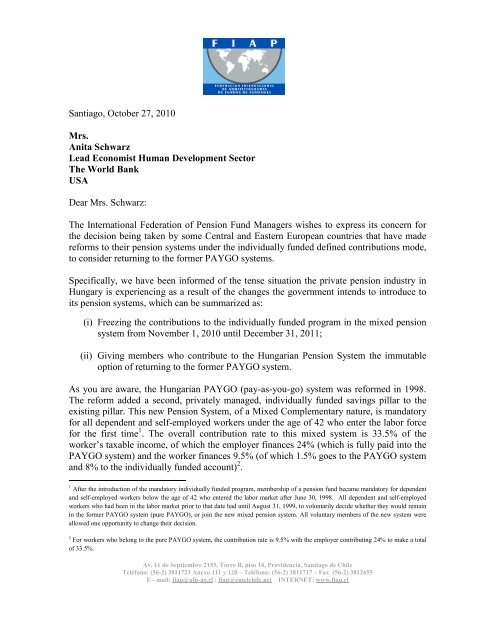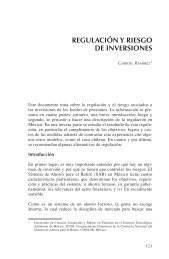Santiago, October 27, 2010 Mrs. Anita Schwarz Lead ... - FIAP
Santiago, October 27, 2010 Mrs. Anita Schwarz Lead ... - FIAP
Santiago, October 27, 2010 Mrs. Anita Schwarz Lead ... - FIAP
You also want an ePaper? Increase the reach of your titles
YUMPU automatically turns print PDFs into web optimized ePapers that Google loves.
<strong>Santiago</strong>, <strong>October</strong> <strong>27</strong>, <strong>2010</strong><br />
<strong>Mrs</strong>.<br />
<strong>Anita</strong> <strong>Schwarz</strong><br />
<strong>Lead</strong> Economist Human Development Sector<br />
The World Bank<br />
USA<br />
Dear <strong>Mrs</strong>. <strong>Schwarz</strong>:<br />
The International Federation of Pension Fund Managers wishes to express its concern for<br />
the decision being taken by some Central and Eastern European countries that have made<br />
reforms to their pension systems under the individually funded defined contributions mode,<br />
to consider returning to the former PAYGO systems.<br />
Specifically, we have been informed of the tense situation the private pension industry in<br />
Hungary is experiencing as a result of the changes the government intends to introduce to<br />
its pension systems, which can be summarized as:<br />
(i) Freezing the contributions to the individually funded program in the mixed pension<br />
system from November 1, <strong>2010</strong> until December 31, 2011;<br />
(ii) Giving members who contribute to the Hungarian Pension System the immutable<br />
option of returning to the former PAYGO system.<br />
As you are aware, the Hungarian PAYGO (pay-as-you-go) system was reformed in 1998.<br />
The reform added a second, privately managed, individually funded savings pillar to the<br />
existing pillar. This new Pension System, of a Mixed Complementary nature, is mandatory<br />
for all dependent and self-employed workers under the age of 42 who enter the labor force<br />
for the first time 1 . The overall contribution rate to this mixed system is 33.5% of the<br />
worker’s taxable income, of which the employer finances 24% (which is fully paid into the<br />
PAYGO system) and the worker finances 9.5% (of which 1.5% goes to the PAYGO system<br />
and 8% to the individually funded account) 2 .<br />
1 After the introduction of the mandatory individually funded program, membership of a pension fund became mandatory for dependent<br />
and self-employed workers below the age of 42 who entered the labor market after June 30, 1998. All dependent and self-employed<br />
workers who had been in the labor market prior to that date had until August 31, 1999, to voluntarily decide whether they would remain<br />
in the former PAYGO system (pure PAYGO), or join the new mixed pension system. All voluntary members of the new system were<br />
allowed one opportunity to change their decision.<br />
2 For workers who belong to the pure PAYGO system, the contribution rate is 9.5% with the employer contributing 24% to make a total<br />
of 33.5%.<br />
Av. 11 de Septiembre 2155, Torre B, piso 14, Providencia, <strong>Santiago</strong> de Chile<br />
Teléfono: (56-2) 3811723 Anexo 111 y 120 – Teléfono: (56-2) 3811717 – Fax (56-2) 3812655<br />
E - mail: fiap@afp-ag.cl ; fiap@entelchile.net I�TER�ET: www.fiap.cl
Many Central and Eastern European countries, including Hungary, carried out meaningful<br />
reforms more than a decade ago, introducing private, defined contribution (DC) systems.<br />
The efforts made by these countries to consolidate their current pension systems is now<br />
being jeopardized by their governments’ needs to reduce the public debt and fiscal deficits<br />
and comply with the objectives and agreements reached with the European Union and the<br />
International Monetary Fund (IMF), which has led some political and government sectors<br />
in such countries to propose the “dismantling” (quasi-nationalization) of the second pillar,<br />
with the subsequent return to the former PAYGO systems.<br />
Nonetheless, we believe that it is a fallacy to think that the public debt will be reduced by<br />
such measures, for the following reasons:<br />
- The fiscal problem being faced by most of the governments of Central and Eastern<br />
European countries is the result of the erosion of the assets of the former pension<br />
system and the recent financial crisis. The demographic factors faced by such PAYGO<br />
systems (increase in life expectancy and reduction in the fertility rate), have severely<br />
impacted them, making them unsustainable. The defined benefits of the PAYGO<br />
systems are in many cases higher than the contributions paid in by workers during the<br />
active stage, which is pressuring the countries with these systems to increase pension<br />
ages and reduce the benefits provided<br />
- The financial sustainability of the pension programs was one of the main reasons why<br />
Central and Eastern European governments implemented the private, defined<br />
contribution pension systems, precisely because they needed to the improve the public<br />
sector deficit perspectives. Hence, the measures proposed by the current Hungarian<br />
government will only be exchanging one kind of debt for another, jeopardizing the mid<br />
and long term fiscal situation. They will be trying to solve a problem today at the cost<br />
of aggravating a problem in the future.<br />
- There is an unequal treatment of the public debt in countries that have reformed their<br />
pension systems vs. those that have not reformed them. In the countries that have<br />
undertaken reforms, the “explicit” accountable public debt originates in the recognition<br />
by the government of the benefits of workers who contributed to the former PAYGO<br />
system and who in future must receive the pensions promised by such system.<br />
Nonetheless, in the countries that have not introduced reforms, this debt, referred to as<br />
“implicit,” is not recorded in the government’s accounting system, despite the fact that<br />
the creditors do exist.<br />
Av. 11 de Septiembre 2155, Torre B, piso 14, Providencia, <strong>Santiago</strong> de Chile<br />
Teléfono: (56-2) 3811723 Anexo 111 y 120 – Teléfono: (56-2) 3811717 – Fax (56-2) 3812655<br />
E - mail: fiap@afp-ag.cl ; fiap@entelchile.net I�TER�ET: www.fiap.cl
Consequently, <strong>FIAP</strong> believes that this “dismantling” (or “quasi-nationalization”) of the pension<br />
funds that the Hungarian government is considering has negative consequences for the<br />
workers, for the pension system and for the economy of the country for the following reasons:<br />
- The potential positive effect of the accumulation of pension funds on the economy<br />
(greater economic growth, deeper and more liquid capital markets, a larger number of<br />
financial instruments available for investment, lower transaction costs), depend to a<br />
great extent on the volume of accumulated funds. The lower the contribution rate to<br />
the individually funded pillar, the lower the volume of accumulated resources, and<br />
consequently, the lower such effects will be.<br />
- This type of measures damage foreign investment in Hungary, since sudden changes in<br />
long term policy increase the perception of risks in the country’s political and<br />
economic standing.<br />
<strong>FIAP</strong> has considered it pertinent to express its opinions on these matters to the World Bank,<br />
convinced of the importance of consolidating and strengthening these new defined<br />
contribution pension programs created in Central and Eastern Europe, the majority of them<br />
with the support of the World Bank, due to their significant benefits for workers, the<br />
economy, the debt and the fiscal deficit of these countries. Our organization is at your<br />
disposal for collaborating on technical matters and providing our support for halting and/or<br />
avoiding these initiatives that affect the countries in the aforementioned region.<br />
<strong>FIAP</strong>, created in May, 1996, is an international agency which brings together the<br />
associations of pension fund managers of the following countries: The Dutch Antilles,<br />
Bolivia, Bulgaria, Colombia, Costa Rica, Chile, El Salvador, Spain, Honduras, Mexico,<br />
Panama, Peru, Poland, the Dominican Republic, Romania, Ukraine, Uruguay and<br />
Venezuela. As of December, 2009, 105 million members were enrolled in <strong>FIAP</strong> member<br />
agencies, accumulating more than US$ 758,536 million in their respective individual<br />
accounts.<br />
Sincerely,<br />
Guillermo Arthur<br />
President<br />
<strong>FIAP</strong><br />
Av. 11 de Septiembre 2155, Torre B, piso 14, Providencia, <strong>Santiago</strong> de Chile<br />
Teléfono: (56-2) 3811723 Anexo 111 y 120 – Teléfono: (56-2) 3811717 – Fax (56-2) 3812655<br />
E - mail: fiap@afp-ag.cl ; fiap@entelchile.net I�TER�ET: www.fiap.cl



